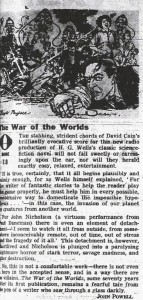War of the Worlds 1/6 (Válka světů, 1967)
Herbert George Wells. Dramatizace Jon Manchip White. Zvuk David Cain (BBC Radiophonic Workshop). Produkce John Powell.
Osoby a obsazení: profesor John Nicholson (Paul Daneman), Ogilvy, jeho asistent (Martin Jarvis), Dora Nicholson (Isabel Rennie), Sir James Stent (Harold Kasket), seržant Holroyd (Alan Dudley), poručík (Anthony Jackson), plukovník (Ronald Herdman), desátník (Frank Henderson), starý gentleman (Walter Fitzgerald), farář (Peter Sallis), mluvčí (Denys Hawthorne, Anthony Hall). Dále účinkují Brian Hewlett, LeRoy Lingwood, Christopher Bidmead, Ronald Herdman, Ian Thompson, Alan Dudley, Carole Boyd, Rolf Lefebvre a Beth Boyd.
Natočeno 1967. Premiéra 9. 6. 1967 (BBC, 19:00 – 19:30 h) -
Obsah: 1. The Red Planet. June 9, 7pm to 7.30pm.
2. The Heat Ray. June 16, 7pm to 7.30pm
3. The Fighting Machines. June 23, 7pm to 7.30pm
4. The Black Smoke. June 30, 7pm to 7.30pm
5. The Red Weed. July 7, 7pm to 7.30pm
6. The Bacillus. July 14, 7pm to 7.30pm
Lit.: anonym: War of the Worlds radio broadcast (BBC, 1950 and 1967). In web War of the Worlds, b.d. (článek). – Cit.:
 What a shame then that this extraordinary sounding production may no longer exist, but we can hope for a flavour of it since the 1967 version has survived and seems to share a connection, because Jon Manchip White is again listed as the writer. Yet there is a mystery here, since as he himself has told me in no uncertain terms, „I could not have been concerned with it because 1967 was the year in which I first came to America to take up a professorship at the University Of Texas.“ The 1967 version certainly can’t be a direct word for word remake, since it is thoroughly updated, with a modern English setting, helicopters and jet fighters, yet White has the sole writing credit, the episode titles are identical and both productions share very similar character names. Despite all this, it remains to be seen how much of White’s original dialogue survives into the 1967 version.
What a shame then that this extraordinary sounding production may no longer exist, but we can hope for a flavour of it since the 1967 version has survived and seems to share a connection, because Jon Manchip White is again listed as the writer. Yet there is a mystery here, since as he himself has told me in no uncertain terms, „I could not have been concerned with it because 1967 was the year in which I first came to America to take up a professorship at the University Of Texas.“ The 1967 version certainly can’t be a direct word for word remake, since it is thoroughly updated, with a modern English setting, helicopters and jet fighters, yet White has the sole writing credit, the episode titles are identical and both productions share very similar character names. Despite all this, it remains to be seen how much of White’s original dialogue survives into the 1967 version.
The first episode introduces us to the character of Nicholson, played by Paul Daneman. Nicholson replaces Wells‘ nameless narrator, though in a fairly major departure from the original novel the character is now an astronomer and Ogilvy his assistant. Nicholson is a determined believer in the possibility of life on Mars, and sees the eruptions he is observing on Mars as proof positive of an impending invasion. This is fully confirmed by the arrival of the first cylinder and the emergence of a Martian. In the second episode troops and helicopters arrive to contain the Martians, with one of the pilots assuming the role of the Artillery man, but despite his best efforts to dissuade them from the attempt, Nicholson is unable to stop Ogilvy and the Astronomer Royal Stent from leading a peace delegation to their doom at the hands of the Heat Ray.
By the third episode a second Cylinder is seen to arrive and Nicholson’s predictions are proven horribly true when the badly injured helicopter pilot stumbles into his home with news of a terrible defeat for the army and air force. There are some effective descriptions of modern weapons succumbing to the Heat Ray, such as the rotors disintegrating on a helicopter and interesting speculation on the problem with fighting the Martians with modern weapons in the midst of a civilian population. The episode culminates with a fantastic re-imagining of the battle for Shepperton with tanks against the Martian Tripods.
In the 4th episode there is another fantastically realised battle, this time with Jet Fighters against the Tripods, but most are shot down and the Martians deploy their Black Smoke against waiting Tanks. By now, Nicholson has met the Priest and the pair become entombed beneath a newly arrived Martian cylinder. Peter Sallis (British readers will likely recognise him for his long running portrayal of the wonderfully reprehensible Norman Clegg in Last of the Summer Wine) plays the conflicted priest to perfection.
For the penultimate episode, Nicholson arrives in London (the character of his brother is entirely excised from this version) and meets the helicopter pilot again, who seems to have landed on his feet and is plotting the survival of the human race by retreating underground, though first he persuades Nicholson to set up base in an abandoned luxury hotel. The highlight of this episode has to be a superb recap of the Martian assault, replayed from the point of view of government pronouncements, at first incredulous in tone, then humorous and smugly confident, before becoming increasingly panicked and strident. In another interesting departure from the novel, Nicholson is far more receptive to the ideas of his companion, and there is an interesting reference to the visibility of the Canals on Mars. I feel this may be one definite example of original dialogue from the 1950 production, as by 1967, the idea of Canals on Mars had been refuted, not least by the return of photographs a few years previously by Mariner 4.
The final episode builds to a highly satisfying crescendo, with the Martians defeated as in the original novel by Earthly germs, but ends a little differently, bringing Nicholson and the helicopter pilot together one more time for an ominous discussion about the chances of another invasion.
The sound and music for the 1967 version is provided by the BBC Radiophonic Workshop, which I have never found to be a particularly entertaining listening experience, with its trademark cacophony of discordant notes, but this is the only real (and subjectively personal) criticism I can level at the production, which boasts excellent acting and a well thought out script, though not uncommonly to adaptations, the portion of the book containing the adventures of the narrators brother is completely removed,. This means rather tragically that the sequence involving the Thunderchild is absent.
The episodes titles and broadcast times are as follows. (Click on the links to see the original BBC Radio Times entry for each).
If you enjoyed this post, please consider to leave a comment or subscribe to the feed and get future articles delivered to your feed reader.






Komentáře
Zatím nemáte žádné komentáře.
Napište komentář k článku